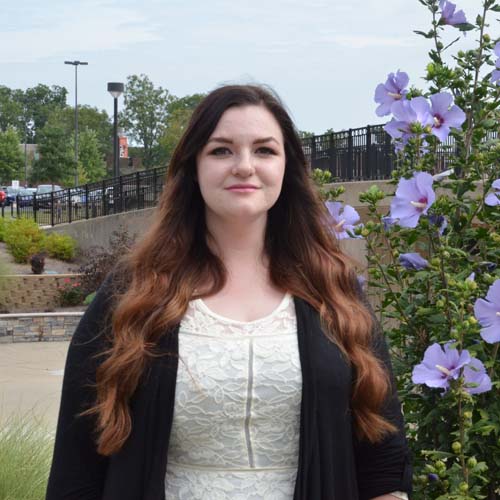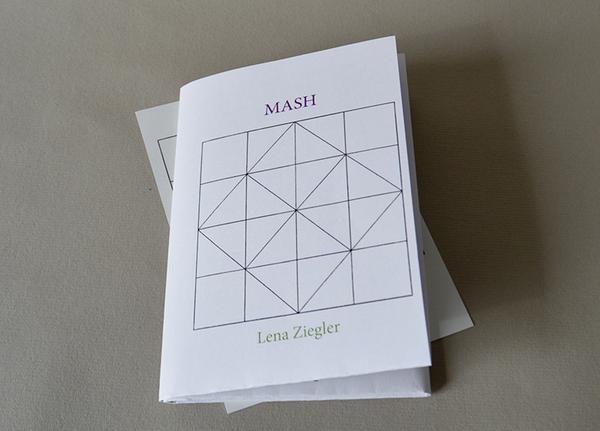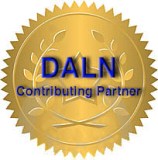Rhetoric and Writing Students Active as Creative Writers and Artists
A sample of Jon's artwork from a collaborative showcase with Kristin LaFollette, "Assemblage of Existentialism," hosted at the Art and Performance Center of West Toledo during February 2019.
For those of you who don’t know me, my name is Kristin LaFollette and I am currently a fourth-year doctoral student in the Rhetoric and Writing program at BGSU. I came from a creative writing master’s program, and when I started my doctorate in Rhetoric and Writing, I stopped writing creatively for a while and wasn’t submitting my work as much. However, as I worked my way through my first year in the program, I started seeing the ways I could integrate my creative writing and art-making into the work I was doing as a writing studies scholar. I started writing poetry again and started using my own photography to create collage work, and some of this creative work ended up in assignments I was working on for my doctoral courses. I created a revision project that I titled “Reverse Ekphrasis” and, instead of writing poetry based on artwork, I created artwork to accompany some of my already existing poems. I realized my identities as a writing studies scholar and creative writer are tightly intertwined and they both come through in the work I do as a scholar, writer, artist, and teacher; as a result, my dissertation research focused on using art as a tool in writing studies research and scholarship.
During my second year in the program, I started collaborating with then first-year student Jonathan Brownlee. Jon is a writer and a visual artist, and we worked together on a collaborative poetry/prose project where we provided each other with words to use in a poem/piece of short prose. We also presented on the pedagogical implications of the activity at the 21st Century Englishes Conference in 2017. This past February, Jon and I showcased a collaborative exhibition of our artwork in Toledo. We have submitted to present at an upcoming conference on using creative writing and art-making in academic writing courses; we hope our proposal is accepted!
When I was a third-year student, I served as a mentor to new graduate students in our first-year writing program and mentored Annie Cigic (an MFA student) and Lena Ziegler (a Rhetoric and Writing student) during their first years at BGSU. Annie began asking questions about our program and, over the course of the year, decided she was interested in pursuing a doctorate in Rhetoric and Writing. Lena and I quickly noticed the similarities in our creative interests and, after my chapbook Body Parts was released in March 2018, we planned and participated in two readings together: one at Claro Coffee Bar in Toledo with former BGSU MFA student Dan Gualtieri, and one at Prout Chapel on BGSU’s campus with Indiana-based poet Steve Henn.
I was curious about how other creative writers and artists position themselves in relation to writing and teaching writing, so I asked Jon, Annie, and Lena a few questions about why they chose to go into writing studies, how they see themselves as creative-critical scholars and writers, and what they are currently working on. Here’s what they had to say:
1) Why did you pursue a doctorate in Rhetoric and Writing?
Jon: I thought long and hard about whether I should pursue a PhD in Rhetoric and Writing or Philosophy. As many people in the program know, particularly those who have been in classes with me, I love philosophy. However, I thought that not only could I make a greater impact (in the world) teaching students writing, but I also saw enough overlap between philosophy, rhetorical history, and rhetorical theory that I could go down a new path while still fulfilling my philosophical interests. I believe it is the perfect middle path, and I have been happy with my decision.
Annie: I want to pursue a doctorate in Rhetoric and Writing for various reasons. The ultimate goal I want to achieve is to become a composition professor. I’ve always known I love the act of writing itself, then I discovered during my first year of the MFA program that I also love teaching writing. Pursuing a degree in Rhetoric and Writing will help me improve as a writer, teacher, and scholar.
Lena: What has always drawn me to writing is that I see it as an opportunity to explore the human condition. What are our individual experiences of being alive? How can I translate that experience through writing and what does the way I do that say about my own position in the world? At the same time, I have always been deeply invested in understanding the world around me, beyond the experience of the individual. How does our culture impact the way we experience life? How do cultures intersect and who dictates the narratives that come to represent that intersection?
These are questions I have explored in creative writing, but I wanted to explore them in a deeper, more scholarly way. In the second year of my MFA, I considered PhD programs in Rhetoric and Writing and Creative Writing. I knew that Rhetoric and Writing was the right path for a few reasons. Not only was it a more appropriate choice for job prospects, but it also would enable me to research the world and culture in ways that are meaningful to me, while growing as an educator. Teaching writing is very important to me because I see writing and rhetorical education as a necessary, fundamental component for the empowerment of all people. I want to share my passion for writing and how it functions in our world with as many people as possible.

2) How do you see your creative work intersecting with your work as a writing studies scholar?
Jon: This question could be answered in several ways, but the simplest answer is that I try to take the same “creative approach” in everything I do. That is to say, I try to be truly interested, flexible, curious, critical, and creative in both my art and my scholarship. I also try to do the same in my approach to teaching. Not to get all theoretical, but I think that is the best approach for life. I think I try to put the “creative approach” at the forefront of everything I do.
Annie: When I was researching PhD programs, I valued a program that would accept creative individuals, writers, and thinkers. It is a big transition going from a Creative Writing MFA to a doctorate in Rhetoric and Writing. I imagine my creative work will intersect in the courses I teach and the courses I take, whether it be the way I create a conversation with others, how I interpret or analyze a reading, or the activities I will plan for my students in a writing course. I will continue writing and reading poetry outside of class—I think it is a good way for me to manage stress and it puts me in a different mindset. Another way I think my creative work could intersect with my PhD work is in my dissertation. It could be in the writing itself or the way I conduct my research as I start writing the dissertation. I do find some of my poetry to be research based, so it is another medium I will use for research, my interests, and for expression.
Lena: My creative work is integral to the work I do as a rhetoric and writing studies scholar. Blending my narrative, poetic voice with my scholarly work is a passion of mine, as well as a necessary component for doing the work I want to do. My primary research interests involve sexual violence, rape culture, sexual shaming, and gender power differentials. One of the primary rhetorical tools I see myself having in making an impact with my research is utilizing the creative skills I have as a writer to leave a lasting impact on those reading my work.

3) What are you currently working on (creative work and/or scholarly work)? Any recent publications (scholarship, poetry, fiction, nonfiction, art, etc.)?
Jon: In 2018, I published a novel that I had been working on for several years called Soliloquy. In February, I had a collaborative art exhibition with Kristin LaFollette entitled “Assemblage of Existentialism” that was displayed at the Art and Performance Center of West Toledo. I will also be doing a poetry reading with Kristin and Lena Ziegler this coming Mother’s Day at Calvino’s in Toledo. And I currently have a collaborative book review (that I’ve worked on with several second-year Rhetoric and Writing PhD students) which is under review at Kairos.
Annie: As of right now, I am focused on my creative work. I am currently submitting poetry for publication. I have two poems published and two more will be published in The Bookends Review soon. I am working on my thesis (I think I have developed the “crazy thesis eyes”) and I will trim the manuscript into a chapbook. I have been saving chapbook contests and will submit the chapbook closer to the end of the semester and throughout the summer. I would like to start reading more about the rhetoric of motherhood. I want to research the culture of birthmothers and adoption. I think once my thesis is completed, I’ll be working on different scholarly and creative work.
Lena: Academically, I identify with writing studies, creative writing, gender studies, and cultural studies. Therefore, I am always trying to build my scholarly and creative identity to represent these disciplines.
Some of my current creative projects including seeking publication for my novel Him & Her, which was a finalist in the 2018 Autumn House Press Fiction Contest. Additionally, I am working on a collaborative memoir with my best friend, Erin Slaughter, who is a fabulous writer and currently pursuing her PhD at Florida State. Erin and I also cofounded and edit The Hunger, which is a literary journal of visceral writing. We have put out four issues so far and don’t see ourselves stopping anytime soon! On my own, I am working on a poetry chapbook and am hoping to continue working on a novella I started last summer while at a writing residency in New York.
Academically, I am gearing up to begin my dissertation, which will be focusing on sexual assault within romantic partnerships. In addition to the work I am doing to prepare for that, I am hoping to finalize some articles I am working on about the rhetoric of public apology in the #MeToo movement, and another about female rhetoricians in the free love and social purity movements of the late nineteenth-century and early twentieth-century in America. I have several other big ideas and goals, but those are the main projects at this moment! Also, I recently presented at a conference at Rice University, analyzing Craigslist Casual Encounters posts, and will be presenting at the Conference on College Composition and Communication (CCCC) in March.
In February, I had my first chapbook, MASH, published with The A3 press. You can find more about it here: https://www.writingmaps.com/collections/a3-chapbooks/products/mash. I also have a creative nonfiction piece slated for publication with both the Indiana Review and Split Lip Magazine later this year as part of a special issue on collaborative writing. Additionally, I have had some recent poems published with Dream Noir and have work forthcoming in The Tulane Review, Requited Journal, and others. I will also be participating in a reading with fellow Rhetoric and Writing doctoral students Kristin LaFollette and Jonathan Brownlee on May 12th as part of the Uncloistered Poetry event in Toledo.
Updated: 03/08/2019 09:59AM


